The Down Side of Early Voting
Many people have voted for candidates who aren't running anymore.
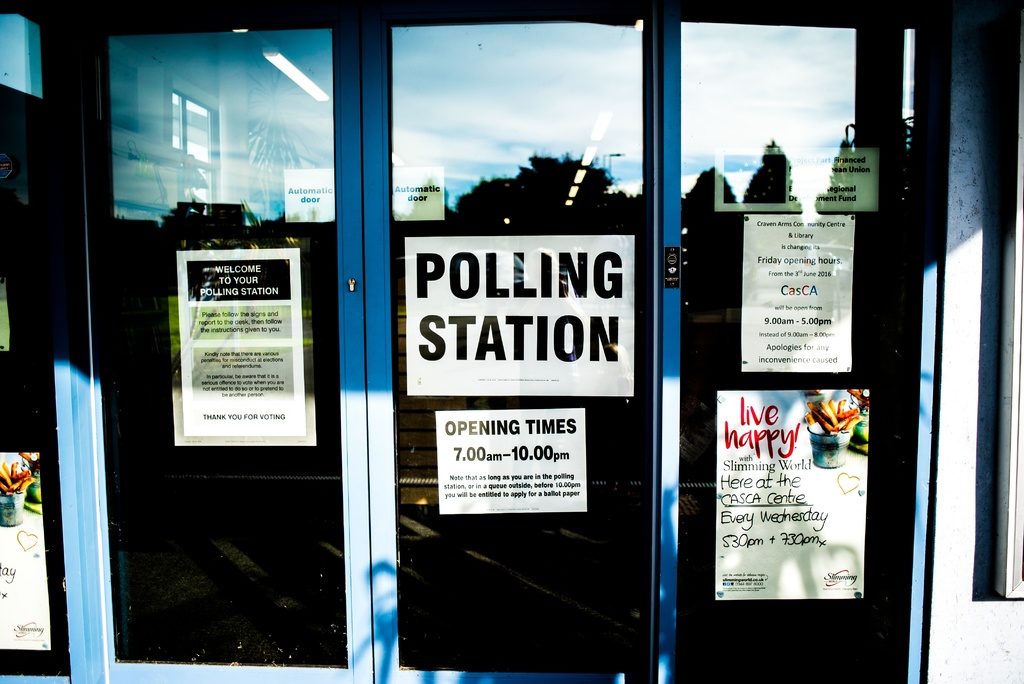
As news that Pete Buttigieg had dropped out of the race for the 2020 Democratic presidential nomination spread, several people on my Twitter feed had the same reaction:
This, naturally, provoked counter-reactions along the lines of this:
Early voting and its variants provides considerable flexibility that doubtless makes it far easier for people to vote. On balance, that’s probably worth the risks introduced. But the cost is non-zero.
Those who early voted in Super Tuesday states like Colorado for candidates like Buttigieg and Tom Steyer, who have subsequently dropped out, are simply out of luck.
And that raises the question: what happens to ballots cast for him? After all, Buttigieg had been polling at 10 percent nationally and 11 percent in Colorado the day before he dropped out, according to FiveThirtyEight.
In short: People who have already turned in ballots for Buttigieg are out of luck. There are no do-overs in Colorado’s election system.
Buttigieg voters who’ve filled out a ballot but haven’t dropped it off yet can drop it in the trash instead, and then head to a Vote Center in their county to vote in person on Monday or Tuesday.
Colorado’s Secretary of State laid it all out on Twitter Sunday evening:
If you turned in a ballot voted for a candidate who is no longer in the race, you cannot vote again. If you haven’t turned in your ballot yet, you can get a new ballot or vote in-person before 7pm on Tuesday.
Even beyond the vagaries of a highly fluid primary system, there are societal downsides to widespread early voting. Northwestern law profs Eugene Kontorovich and John McGinnis wrote about this back in 2014, when President Obama was working to expand the practice.
For all its conveniences, early voting threatens the basic nature of citizen choice in democratic, republican government. In elections, candidates make competing appeals to the people and provide them with the information necessary to be able to make a choice. Citizens also engage with one another, debating and deliberating about the best options for the country. Especially in an age of so many nonpolitical distractions, it is important to preserve the space of a general election campaign — from the early kickoff rallies to the last debates in October — to allow voters to think through, together, the serious issues that face the nation.
The integrity of that space is broken when some citizens cast their ballots as early as 46 days before the election, as some states allow. A lot can happen in those 46 days. Early voters are, in essence, asked a different set of questions from later ones; they are voting with a different set of facts. They may cast their ballots without the knowledge that comes from later candidate debates (think of the all-important Kennedy-Nixon debates, which ran from late September 1960 until late October); without further media scrutiny of candidates; or without seeing how they respond to unexpected national or international news events — the proverbial “October surprise.” The 2008 election, for example, could have ended differently had many voters cast their ballots before the massive economic crisis that followed the collapse of Lehman Brothers that September. Similarly, candidates often seek to delay the release of embarrassing information, or the implementation of difficult policies, until after votes have been cast. A wave of votes starting months before the election date makes this easier.
Early voting not only limits the set of information available to voters; to the extent that it decreases the importance of debates, it might also systematically help incumbents and quasi-incumbents like vice presidents, who generally have the advantage of having been in the public eye longer.
More fundamentally, early voting changes what it means to vote. It is well known that voters can change their minds — polls always go up and down during a campaign season. A single Election Day creates a focal point that gives solemnity and relevance to the state of popular opinion at a particular moment in time; on a single day, we all have to come down on one side or the other. But if the word “election” comes to mean casting votes over a period of months, it will elide the difference between elections and polls. People will be able to vote when the mood strikes them — after seeing an inflammatory ad, for example. Voting then becomes an incoherent summing of how various individuals feel at a series of moments, not how the nation feels at a particular moment. This weakens civic cohesiveness, and it threatens to substitute raw preferences and momentary opinion for rational deliberation. Of course, those eager to cast early will be the most ideological — but these are precisely the voters who would benefit most from taking in the full back and forth of the campaign.
Moreover, there are other ways of achieving some of the benefits of early voting, such as old-fashioned absentee ballots or setting up more polling places. Even a limited few-days-early voting period could convey most of the advantages of the practice while limiting the most severe democratic costs.
Moving Election Day to the weekend—or, indeed, making it the whole weekend—would help a lot. And, yes, more polling stations would be great—although staffing them may well be problematic.
Primary elections are much more fluid than general elections, especially those for President. People tend to vote along party lines and new information has only marginal impact. Still, it’s odd to have some people voting more than a month before the “election.”
Ranked-choice voting would certainly go a long way to solving the “my candidate has dropped out” problem. But, even then, the nature of the primary process is such that preferences can be as fluid as the field. One might well have preferred Amy Klobuchar a month ago but have since decided that she’s simply not viable and Joe Biden is the best alternative in what has become a defacto two-man race.
Frankly, early voting isn’t close to the top of the list of problems with the way we select party nominees for President. The fact that money plays such a huge role is probably at the top. As is the fact that so many superbly qualified candidates get eliminated in the “invisible primary” before a single ballot is cast. Or the fact that votes in four states have so shaped the contest that most voters don’t even get a say in the process.
Still, this is a relatively easy fix.

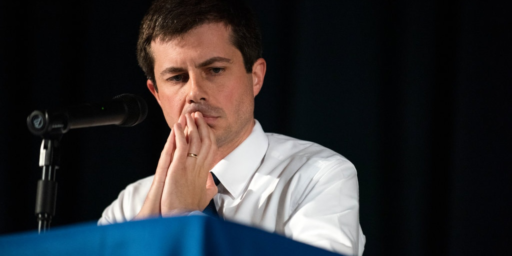
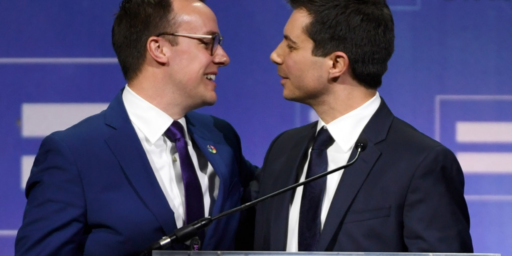
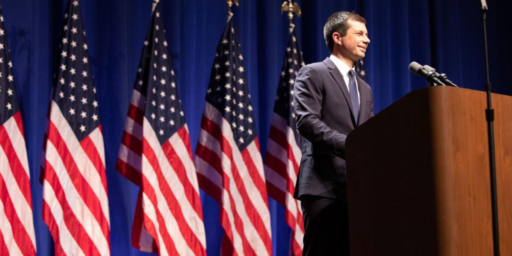
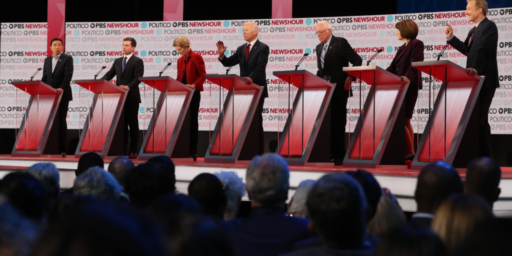
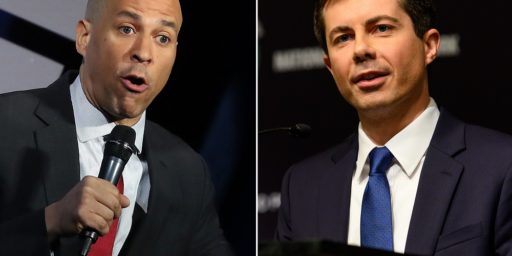
Personally, I have never voted early. My voting precinct has sometimes been close enough to walk to (It is now. I can get back and forth in less than 15 minutes) and I have no desire to stand in line for an hour plus. With the exception of I think the 2004 Presidential election, the precincts I have voted in have had no or very small lines on election day.
I suspect that part of the problem is that some people don’t realize that early voting does not mean early counting. So they may be voting for, say, Kamala Harris in the mistaken belief that their vote signals their support. It actually doesn’t signal anything at all until the envelope is opened, which could be after Election Day itself.
Yep, I voted early here in Texas. So did my wife and daughter.
Yes, there is a downside to early voting. On the other hand, there is a downside to Tuesday workday voting along with the predicted bad weather.
While we are talking about election procedures, can we also move all primaries to later in the year? This is far too early.
My Washington State ballot isn’t due until the 10th. I was going to vote for Mayor Pete but thought it would be prudent to see how things shake out after Super Tuesday. Guess I made the right move.
GAAAACK AAAACKKKK! “The integrity of that space…” Please, spare me the high minded horse shit. The integrity of that space has been violated, raped, eviscerated and incinerated by the practices of voter roll purges, poll closures, voter ID requirements, poll taxes, poll tests, etc etc etc since the beginning of this country. To complain about early voting which allows people to vote at a time that is not just convenient for them but possibly the only time they can vote, as opposed to being forced to stand in the rain for hours on a Tuesday evening in November because their precinct has only one voting machine per 1,000 voters…. Please, just stop it.
As far as, allowing “voters to think through, together, the serious issues that face the nation.”…
BWAHAHAHAHAHAHAHAHAHAHAHAHAHAHAHAHAHAHA…. Real world on lines 1 and 2 for Eugene Kontorovich and John McGinnis … Real world on lines 1 and 2 for Eugene Kontorovich and John McGinnis …
Yeah, that’s just what people were doing on Nov. 8, 2016, thinking thru the serious issues that face the nation. That is just what they were doing as they pulled that lever for trump.
Unless we’re going to be willing to make Election Day a holiday in some way, Early Voting (or Vote by Mail) is the most inclusive way to run an election.
Even if Election Day becomes a holiday of some sort, in a world where there can be multiple elections in any given year (local, state, federal, plus primaries for one or more), how many of those holidays can we reasonably expect to take in a given year? We live in a society where Target now opens at 6:00 PM on Thanksgiving Day.
Early voting seems like the best of a series of imperfect alternatives. People who want to wait, can. People who need to vote early, can.
Which runs up against the major party that prefers making it hard to vote.
I suspect voters who are undecided tend to hold off. Here in AZ we are officially advised to mail 6 days before the election as the ballots must be received by election day. But there is still the less convenient option of waiting and voting in person.
Last year, our town meeting had a warrant article to extend voting by *one hour*–starting it earlier at 7 a.m. than the previous 8 a.m., so that voting would be from 7 a.m. – 7 p.m. It ended up being one of the most contentious things discussed, mostly because it’s hard to find enough poll workers to adequately staff voting day.
The evidence was pretty clear that this was a good idea–starting voting at 8 a.m. in our mostly commuter town meant that everyone who needed to be at work by 8 a.m. had to vote in the evening, and that presented all kinds of problems considering the standard work commute in our area is around 40 min. to an hour–it basically meant that everyone was rushing in at the end of the day–if they even went to vote.
I cannot imagine how many people at the town office would spontaneously combust if it was suggested they had to staff for an entire weekend.
Texas closes hundreds of polling sites, making it harder for minorities to vote
While there are disadvantages to early voting, I do wonder if turnout is going to be affected by the coronavirus coverage, particularly among the elderly. Even slight shifts in the electorate can impact results.
I do not think the Democratic primaries problems this year are so much early voting per se as they are the schedule of which states vote when. SC 3 days before CA (a mostly by mail state) is pretty problematical.
AZ seems an odd location for the March 15 debate considering the bulk of AZ votes will have been mailed by then. We have already seen a debate in NV after most of the votes were already cast.
@Teve:
Bexar County (San Antonio) went to voting center concept (mentioned in the article) this year. Now anyone can vote anywhere in the county whereas before you had to vote in your assigned precinct. The voting centers have more stations and now have a paper trail as well.
Although polling sites have decreased, I think this is much more accessible. For example, my wife is a teacher who teaches at least 10 miles away from our normal voting location. On Tues, Election Day, she has to stay late at school for a PTA function. There would be no way to sneak out and drive all the way home to vote and return. Now she can go two blocks away, vote and return. I really think it is better. How that works across other areas of Texas I cannot say.
I early voted. It wasn’t for Buttigieg, it was for Warren. I’m not upset that she isn’t going to win, I sort of knew that. I also knew, and still know, that strange things can happen, but I don’t think they will. I’m ok with that.
If you want to vote strategically and, for instance, vote for the candidate that isn’t Bernie Sanders that seems most viable, I get you. And you needed to wait until the last minute to do that. You know, act strategically.
Two close friends who have science doctorates misread the instructions that came with the Colorado ballot and thought they had to have a mailed ballot in by February 24th when the instructions actually said that ballots should be mailed by the 24th to be sure it arrives in time to be counted.
But in my county at least, there are dropboxes to simply drop the ballot off, which is what I plan to use. I’ll drop my ballot off either this evening or sometime tomorrow.
Does anyone know what happens to the delegates for people who dropped out? Also, if early voting results in a candidate that dropped out receiving enough votes to get delegates, will they still get the delegates?
@Andy:
I’d have liked to see the instructions; I’d be willing to bet that they were sufficiently poorly written to ensure that kind of confusion.
Some of my business major students liked to say that they didn’t need to know how to write, because they’d hire a competent secretary to do their writing for them. I would ask how they considered themselves capable of evaluating someone else’s grammar, spelling, and punctuation when they hadn’t yet mastered those skills themselves. I never got an answer.
@CSK:
There doesn’t seem to be a PDF version of the paper instructions online.
It does clearly state that if returning by mail you need to “Apply adequate postage to your Return Envelope. Mail by February 24th to ensure enough time for deliver.”
But there are several references to the 24th on the instructions as that was also the last day to get a replacement ballot, the last day to receive a ballot by mail, and the last day to update your address/registration (though the latter can still be done through election day at a central office.
So, I can see how one could get confused by skimming the instructions, but a careful reading should make it pretty clear. My friends admitted they didn’t look at the instructions closely enough, but they are happy with their Biden votes.
Ironically the instructions are more lengthy and complicated because there are so many options to vote and/or turn in a mailed ballot, and each option needs detailed explaining.
@Andy:
It depends on the state, I think. Some states allow for pledged delegates to go to the convention unbound, other states bind their delegates for the first round of voting (meaning, they are required to cast the delegate votes for the candidate that received them, regardless of whether or not they are still in the race), releasing them only for subsequent rounds. Some states bind the votes based on endorsements (hypothetical example: any votes for Castro would go to Warren, since Castro specifically endorsed Warren when he dropped out).
@Andy:
Ah, okay. I’m guilty of skimming some instruction leaflets myself.
The solution may be to make the instructions as brief as possible consonant with clarity, and to boldface deadlines.
I’m not sure moving to a weekend would help; the people who have the hardest time getting to the polls probably has a huge overlap with people who work on the weekend.
3 words: Mail in voting.
@OzarkHillbilly:
My Facebook feed this morning is full of people who mailed their Colorado ballot marked for Buttigieg a week ago, and are pissed as hell.
@Michael Cain:
The DNC should rethink letting vote-by-mail states close their elections 3 days after SC.
@charon:
I might have phrased that, “The DNC should rethink letting any state hold primaries three days before Super Tuesday, when almost one-third of the delegate slots are up for grabs.” If they’re going to let little non-representative states vote in February, they ought to make them all finish up by the 18th or so, two weeks before the big day.
@Michael Cain:
I don’t know anyone here who mailed a ballot for Buttigieg. Are those people pissed that he dropped out, pissed at the early voting system or just generally pissed at the situation?
Who pays to upgrade all the state voting systems to rank-choiced? In my state, that presumably requires upgrading at least all of the optical scanners that do filled-in bubbles today to limited handwriting recognition.
@Andy:
Mostly the general situation, I think. Sort of, “I want all the convenience of vote-by-mail, but I also want a do-over if my first choice candidate drops out.” My response, in the one case where I responded, was (like our host), “Oh, you want ranked-choice voting! How much are you willing to pay for it?”
@Stormy Dragon: Yes, but weekend voting will make it more convenient for “me” and isn’t that what really matters?
Also, about the votes for candidates who have already dropped out, doesn’t the 15% rule make that supposed disadvantage/irregularity moot? At 10% polling support in any given state, a vote for Buttigieg yields the same outcome (0 delegates) whether he drops out or not, unless the margin or error is 50%. The same rules hold as for ranked preference, at some point, if you want your vote to “matter,” you have to vote for A or B. C doesn’t cut it, because he or she will never overtake A or B.
@Just nutha ignint cracker:
I’m salaried and have a relatively flexible schedule, so I almost always try to do errands while others are at work. Weekends would be a giant pain in the ass for me. But I think more people who work 9-to-5 would benefit.
No. It’s one thing to vote for Warren or Klobuchar and have that be irrelevant because they didn’t get enough votes. I was able to express a preference for a candiate and simply didn’t win. It’s quite another to vote for Buttigieg or Steyer and then have that be irrelevant because they dropped out of the race.
Your early vote for Amy just went into the trash bin. She will support Biden.
I will vote on Primary Election Day in Illinois March 17.
I wonder who will be left in the race?
@Michael Cain: Life is rough all over.